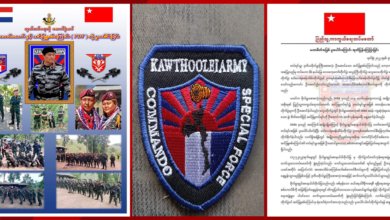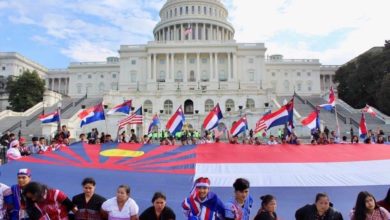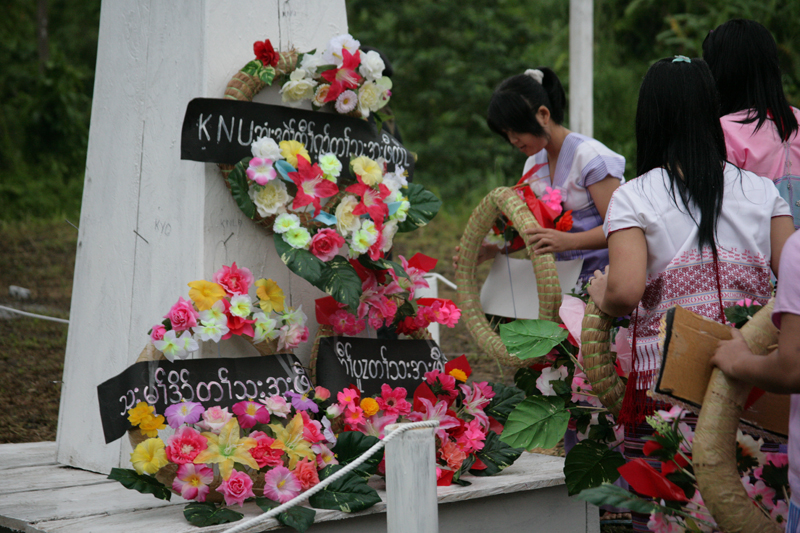Caught in a Two-Front War in Post-Ceasefire Karen State

Despite a ceasefire agreement between the Karen National Union and the Burma government and endless rounds of dead-end peace-talks, the Burma Army continues to consolidate and reinforce its military bases in Karen State. Many observers fear the government is ‘playing’ peace politics with the KNU and other ethnic groups while it continues to militarize the ethnic states readying them for its ‘development invasion’.
In January 2012 the Karen National Union signed a historic agreement with the ‘reformist’ Burmese government under President Thein Sein to end more than half a century of wars in Karen State. The agreement was hailed as a milestone because it was the first time since January 1949-the date the Karen people launched their armed revolution for autonomy-that the KNU and Burmese government has had any ceasefire accord. There are both skepticism and hope among the general Karen public from the very beginning. Some were concerned that the ceasefire agreement is nothing more than the Burmese government’s ploy to showcase its ‘reform’ process in order to earn international acceptance and support. But others simply hope that the agreement would bring some sort of peace and an end to military hostility between the two groups so that Karen civilians in the conflict zone can start living a normal and peaceful life. After more than five decades of wars with the central government, Karen State has become one of the least developed regions in the ‘Union of Burma.’ But with ceasefire and peace between the government and the KNU on the horizon, it was hoped that the region in general and ordinary Karen civilians in particular could resume a normal life and embark on development and prosperity. As a result, in spite of all the worries, hope, and skepticism, Karen population in general strongly supports the peace initiative.
But fast forward one year and a half later, many Karen people are still questioning the merits of the ceasefire. Has the ceasefire improved their life? Has it given them more security? Will there be a tangible and lasting peace in Karen State? Have the ordinary Karen people benefited from this agreement? These are just some of the questions lingering in their mind. Of course despite its shorting coming and many weaknesses, the ceasefire does bring some semblance of normalcy, peace and a new beginning.
Most Karen civilians in the conflict zones agree that it makes life easier for them because security and freedom of movement in their communities have improved considerably. At least they don’t need to worry about being arrested or afraid of being killed by the Burmese army soldiers when they are traveling or tending to their farms and animals. In addition, some internally displaced Karen people have been resettled back to their communities to begin the process of rehabilitation and reconstruction. Apart from occasional, but minor accidents, armed conflict and wars have almost completely stopped in Karen State.
In retrospect, this is a positive development and a sign of improvement that the ceasefire has brought to wary Karen civilians since agreed to in January 2012. However, beyond these changes and developments in the past one and a half year, there is nothing tangible that would assure the Karen public and some in the KNU circle that the ceasefire would bring further benefit, lasting peace and security to the Karen people. Instead, while some major problems are still unresolved, there are also new challenges and worrying signs that emerge out of this agreement.
Threat of Wars Is Still a Reality
Since the agreement to end military hostility in January 2012 was signed, not a single government soldier has left KNU-controlled territories. Instead, according to many Karen civilian and military leaders, government reinforcement and supplies have increased considerably. Existing government military bases and outposts have been replaced and rebuilt with concrete materials that can last longer. Older roads have been improved so that supplies and reinforcements can reach frontline bases quickly and efficiently. Government troops have been moving back and forth with ease without any fears and worries about being ambushed or delayed by the Karen National Liberation Army soldiers.
These developments have clearly indicated something to Karen civilians and Karen soldiers that the Burmese army is here to stay for a long haul and that there is no intention of leaving anytime soon. Besides, the military code of conduct that will prescribe rules and provide guidelines for both Burma Army and KNLA soldiers to follow has yet to be agreed to – a year and a half since the ceasefire agreement was signed. So far, there has only been meeting after meeting, but no results have been achieved. Under the current circumstances and as evidence shows, there is no indication that a military code-of-conduct would be helpful. After all, how would anyone expect an army that has repeatedly ignored the president’s orders to halt its military offensive against ethnic people to also obey any kind of military code-of-conduct? Consequently, the continued presence of a large number of government troops in Karen State and KNU-controlled territories is a testament that this ceasefire is very fragile and weak.
If the government has genuine good intention and is serious about making peace with the Karen people it can show good faith by simply dismantling some of its military bases and removing its troops away from KNU-controlled territories and the Karen civilian population. Otherwise, how could anyone trust and negotiate with an enemy while constantly under military threat? And with or without a military code-of-conduct, it is never certain that two opposing armies standing next to each other could be expected to always behave and follow rules. With this in mind, Karen State is still a war zone and armed conflicts could resume at any time as easily as pulling a trigger. Recently some local KNLA leaders have banned de-mining projects in their areas because they believe that the ceasefire agreement has not consolidated and is still very shaky.
As one high ranking KNU official puts it, the “Current ceasefire has no concrete guarantee and assurance.” Indeed they have every good reason to believe that way. For one thing, the government has not removed any of its troops or military bases. Burmese soldiers are still harassing local Karen civilians and KNLA soldiers at will. Most government military bases are located close to civilian population and this makes it very difficult for local people to move around safely beyond their immediate communities. Recently there have been reports that Karen civilians in many KNU-controlled territories are still subjected to forced labour to construct military bases and build roads for the Burmese army. And in one of many serious incidents a local KNLA officer was brutally beaten and detained by the Burmese army for many days before being released after he chased a group of people trying to evade taxes collector at a KNU-controlled gate. Besides, as reported recently in Karen News, local KNU officials have also received information that regional Burmese military commanders have received orders to create conflicts and division between KNU leaders in some areas. The continued armed clashes in Kachin and Shan states is a constant and clear reminder that ceasefire in Karen State is as fragile as anywhere else in other parts of the country. If the government cannot honour its agreements with the Kachin and Shan people, one can never believe and expect that its agreement with the Karen people will be respected as well. And make no mistakes, all these disturbing developments have happened during the period of ceasefire and negotiation. With this in mind, in spite of all the good talks about peace, reforms, and changes, the Karen people are still very much at war with the Burmese army. But only that they are fighting a sort of war that put them completely at a disadvantaged position because they can only watch in awe and helplessly while the enemies are constantly rebuilding and reinforcing.
Economic Colonization and the False Promise of Development
The foundation of the current ceasefire between the KNU and the Burmese government was grounded more on economic and business interests than on any grand strategy to find solution to political problems. It did not even start as part of a wider changes and reforms that are taking place in Burma. Long before Thein Sein’s government came to power in 2011, it was learnt that the former military government had already begun to secretly approach KNU’s Brigade 4 in southern Karen State to negotiate business deals and development projects. With the multi-billion dollars Dawei Deep Sea Project on the horizon, the Burmese government has well understood that KNU’s cooperation is needed because much of the economic activities will take place in areas where the KNLA is active and strong. But according to a local KNLA officer in the area, instead of approaching the KNU’s leadership directly, the government and some influential businessmen had secretly knocked on the KNU’s Brigade 4 door and encouraged some of its local KNLA commanders to break away from the KNU and strike a separate peace deal. And in return KNU’s Brigade 4 will be given special treatment and allowed to do business with the government. This divide-and-rule technique is nothing new and hardly surprising. In 2007 the government was able to do it in the KNU’s Brigade 7 and it hoped to replicate this tactic again. But this time local KNLA commanders there stood firm and politely refused the offer. Instead they suggested that should the government be interested in “peace and development,” they should approach the central KNU’s leadership directly. After repeated failed attempts at enticing local KNLA commanders with the many sweet deals, the government finally brought their “peace and development” message to KNU directly just in time before the generals in Nay Pyi Taw shed their military ‘skins’ and changed into new civilian clothing.
From the very beginning the motives behind this ceasefire has been all about business and profit making projects. Whether many Karen people paid attention to or not the fact that this ceasefire is all about economic interests than anything else was clearly reiterated during the ceremony celebrating the opening of the KNU’s liaison office in Myawaddy in August 2012. In the post-ceremony interview with the media Aung Min, the government chief negotiator, repeatedly said that the liaison offices are important and needed because when you do business together you need a place and center where communication can flow through smoothly and efficiently. He didn’t mention a single word about how liaison offices will serve as centers where political and military conflicts will be discussed and resolved during the early stage of the ceasefire process. And in one of his earlier comments in Pa-An, the capital of the Karen State, Aung Min even went so far as to suggest that if economic condition has improved in the Karen communities, they will no longer wage wars of resistance against the government. But whether his comments may prove to be true or not there is clear indication that the Burmese government is working hard toward achieving the last part of Aung Min’s argument. Instead of giving the Karen people what they need most such as more autonomy to manage their affairs and natural resources, the government is instead giving out dubious deals such as permits for car licenses and permission to open business enterprises to selected individuals and groups. KNU officials have been invited both secretly and officially to Nay Pyi Daw on numerous occasions to discuss mining and other business related projects at the same time while the government is claiming that it has no time to speed up negotiation on other important matters such as military code of conduct and political issue. By satisfying some in the leadership positions with lucrative business deals and special privileges the government is trying to drive a wedge and tie their hands in a way that makes it hard and unattractive to make any political demands.
After all, as one Karen activist puts it, business deals would put Karen leaders in a difficult position because “You can never bite a hand that feeds you.” But at the same time while business deals are handed out when no political progress has yet to be made, it is the ordinary and powerless Karen civilians who may bear the brunt of Thein Sein ’s arms for development strategy. A year and a half since Pa-An Agreement was signed there have already been reports by local Karen human rights organization that a great number of Karen villagers are losing their lands and properties to both government and wealthy businessmen in many parts of the Karen State in the name of economic developments.
This disturbing trend has many Karen people worried and frustrated. As one local Karen activist posted on his Facebook page, “We have had a ceasefire for only a year, but have already lost a large part of our forests and lands.” And another Karen woman activist lamented, “Having gone to and observed the situation in Dawei I have seen nothing but an invasion and economic colonization of our lands and state.” With the collusion of some corrupted local officials, it has been reported that villagers’ properties have been taken away either by force or paid for at a very dismally low price. In some places, large tracts of lands and forest areas have been flattened to make way for gold mining and other extractive business without any concerns for sustainable development and environmental disaster. And often these destructive extractive businesses do little to benefit ordinary Karen civilians. As one local Karen official said, “Our people are the one who eat the leftovers from the mining and other extractive business while companies, wealthy businessmen, and people in the leadership positions eat the big pie.”
In sum, whether this ceasefire will succeed and bring lasting peace remain to be seen. Other than a temporary cease in military hostilities, no progress has been made on the political front. Looking back a year and a half later nobody is yet certain how the next stage of the peace process will turn out. But in the meantime two things are clear: not a single Burmese troop has left KNU-controlled territories but economic colonization and exploitation have already begun in many parts of the Karen communities. While Karen people are watching in awe and helplessly, their enemy is reinforcing and preparing their next move. If the latest developments in Kachin and Shan States are any indication, it will be only a matter of time before they become the next targets of the government’s focus.
On a different note, President Thein Sein perhaps would like to improve Karen people’s lives and make them financially better off so that they don’t wage wars against the government anymore. To that end, there have already been some signs out there that he is following through his promise. But make no mistakes. When he meant that the government wants to improve their life and bring prosperity to them he did not mean all of them. However, he is confident that once he can make some of those in leadership positions rich, the ordinary and the powerless will simply follow the lead. It is important for Karen leaders to remember that in this post-ceasefire period, Burma government is not only fighting a military war, but also an economic war that will be a lot harder for the Karen to withstand.
*Saw Greh Moo is a Graduate Student at the American Military University in West Virginia and Program Officer for Community Empowerment Initiatives at the Salween Institute (www.salweeninstitute.org). His areas of focus are in good governance and citizen rights and responsibilities. He can be reached by email at grehmoo@hotmail.com.




